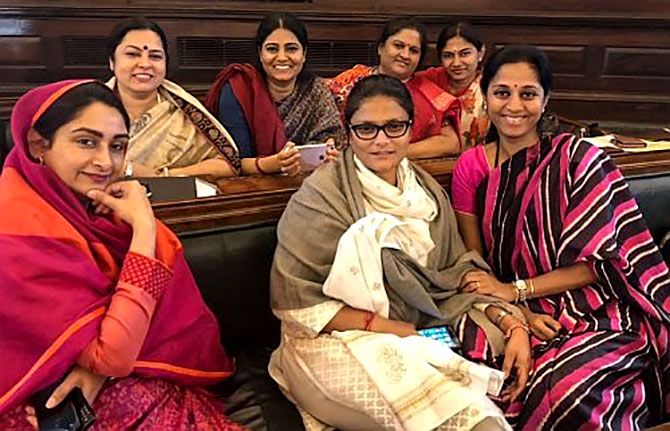There were 66 women members of Parliament in the 16th Lok Sabha, i.e. 12.45 per cent of the Lok Sabha MPs were women.
In India, there is a wide gender gap in politics and powerful women political personalities can be counted on fingers.
In 2014 parliamentary elections, for 543 constituencies 661 women contested, out of which 144 were from national parties, 150 from state parties, 163 from unrecognised parties and the remaining 204 women contested independently.
Out of the 144 contesting on a national parties' tickets, only 35 won.
Out of 150 contesting on state parties' tickets, only 23 won the seats.
Likewise, out of 163 women contesting from unrecognised parties, only three won, while none of the Independents could secure a seat in the Lok Sabha and also forfeited their deposits.
Party-wise women candidates
The chart above shows the number of women contesting from various national and state parties.
The highest number of candidates were from the Indian National Congress, with a total of 59 women contesting out of whom four won, 31 lost and 24 forfeited deposits.
The highest number of successful candidates were from the Bharathiya Janata Party, where 29 out of 37 contestants won their seats.
Constituency-wise vote share of women candidates
The above map shows the vote share secured by all the women contesting in each constituency.
For each constituency, we have added the vote share secured by all the women candidates contesting the election.
Also, the status of candidate securing the largest vote share has been shown.
Vote share of successful women candidates
The above map shows the vote share secured by successful women candidates in the 2014 elections.
With 76.67 per cent, Darshana Vikram Jardosh, BJP candidate from Surat, recorded the largest vote share.
She was followed by BJP's Sushma Swaraj (Vidisha) and Sumitra Mahajan (Indore) with a vote share of 67.21 per cent and 65.22 per cent respectively.
Former Congress president Sonia Gandhi claimed the fourth place with 64.22 per cent vote share in her stronghold Rae Bereli.
For more data-related stories, go to REDIFF LABS










